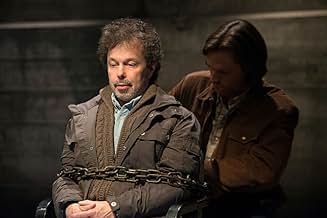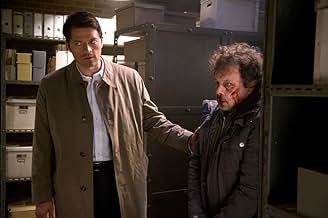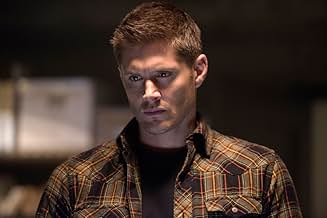The Hunter Games
- Episode aired Jan 20, 2015
- TV-14
- 43m
IMDb RATING
7.7/10
3.8K
YOUR RATING
Sam and Dean try to deal with the aftermath following the bloodbath. Castiel attempts to fix a struggling relationship with Claire, and Claire wants revenge on Dean for what he did to her fr... Read allSam and Dean try to deal with the aftermath following the bloodbath. Castiel attempts to fix a struggling relationship with Claire, and Claire wants revenge on Dean for what he did to her friend.Sam and Dean try to deal with the aftermath following the bloodbath. Castiel attempts to fix a struggling relationship with Claire, and Claire wants revenge on Dean for what he did to her friend.
Mark Sheppard
- Crowley
- (as Mark A. Sheppard)
Kathryn Newton
- Claire Novak
- (as Kathryn Love Newton)
7.73.8K
1
2
3
4
5
6
7
8
9
10
Featured reviews
Ok but doesn't lead anywhere
Not sure why the boys even have to tell Crowley to get the blade when they tell him to hold onto it anyway
Rowena was fun to watch
Claire here was ok
The moc thing was a drag, i don't enjoy their macho let us torture thing, its boring.
The episode alludes to the ongoing battles for survival and dominance that define both the human and supernatural realms of the series
"The Hunter Games," the tenth episode of Supernatural's tenth season, directed by John Badham and written by Eugenie Ross-Leming and Brad Buckner, marks a decisive return to the show's central mythology after the midseason break. Picking up in the immediate aftermath of Dean's blood-soaked rampage at Randy's house, the episode is steeped in the consequences of violence, the burden of the Mark of Cain, and the complex web of alliances and betrayals that define the series' supernatural landscape. The narrative is structured around three main threads: the Winchesters' desperate search for a cure to Dean's affliction, Castiel's ongoing struggle to reach Claire Novak, and the escalating power games between Crowley and Rowena in Hell.
The episode opens with Crowley plagued by visions of betrayal and assassination, a psychological assault orchestrated by his mother, Rowena, who is quietly undermining his authority as King of Hell. Ruth Connell's performance as Rowena is both sly and theatrical, injecting a sense of unpredictability into the political machinations of Hell. Her manipulation of Crowley and the murder of Guthrie, one of his loyal demons, is emblematic of the episode's focus on trust and treachery. Mark Sheppard's Crowley, usually so self-assured, is visibly shaken, and the dynamic between mother and son continues to be one of the season's most intriguing subplots, blending dark humor with genuine pathos.
Back at the Men of Letters bunker, Dean is haunted by guilt over his actions, admitting to Sam and Castiel that he feels more like a killer than a hunter. This confession is a pivotal moment, as Dean's vulnerability contrasts sharply with the stoic facade he often presents. Jensen Ackles delivers a nuanced performance, capturing the internal conflict that the Mark of Cain has wrought. The episode's cinematography underscores this turmoil, with shadowy lighting and tight close-ups emphasizing Dean's isolation and the oppressive weight of his burden. The bunker, usually a place of safety, feels claustrophobic and tense, mirroring Dean's psychological state.
The central plot revolves around the Winchesters' plan to extract information from Metatron, the Scribe of God, about how to remove the Mark of Cain. Castiel, Sam, and Dean orchestrate a risky scheme: with Crowley's reluctant cooperation, they retrieve the First Blade and bring Metatron to the bunker. Curtis Armstrong's portrayal of Metatron is as infuriating as ever, oscillating between smugness and desperation. The interrogation scenes are among the episode's highlights, with Dean's barely restrained rage culminating in a violent confrontation. As Dean tortures Metatron, the Mark glows ominously, signaling his loss of control and the deepening danger he poses not only to his enemies but to himself and those he loves.
Parallel to these events, Castiel continues to reach out to Claire Novak, who is consumed by grief and anger over the death of her surrogate father, Randy. Claire's storyline, while less central, provides an important counterpoint to the Winchesters' supernatural struggles. Kathryn Newton imbues Claire with a mix of vulnerability and toughness, and her interactions with Castiel are fraught with unresolved pain. The subplot reaches its climax when Claire, manipulated by her new friends Brit and Tony, nearly becomes complicit in an attack on Dean. However, in a moment of clarity, she intervenes, preventing further violence. This act of mercy marks a turning point for Claire and offers a glimmer of hope for her future, even as she chooses to leave Castiel's care for now.
The episode's pacing is brisk, balancing intense confrontations with quieter moments of reflection. John Badham's direction is efficient and focused, allowing the actors' performances to take center stage. The editing is tight, particularly in the scenes leading up to and during Metatron's interrogation, where the tension is palpable. The use of music, especially during the episode's more introspective sequences, adds a layer of melancholy that underscores the characters' emotional states. The dialogue is sharp, with moments of dark humor-such as Sam's quip calling Metatron a "dickwad"-providing relief from the otherwise heavy subject matter.
One of the episode's strengths is its willingness to grapple with the moral ambiguity that has always defined Supernatural. The Winchesters' reliance on Crowley and Metatron-both former antagonists-highlights the blurred lines between good and evil, necessity and compromise. The episode also raises the stakes by suggesting that the solution to the Mark of Cain may require a "powerful force," possibly one that comes from within Dean himself. This thematic thread is woven throughout the hour, culminating in Dean's realization that he was dangerously close to killing Metatron and that he may not be able to control himself much longer.
Despite its many strengths, "The Hunter Games" is not without flaws. Some critics have pointed out that the episode's reliance on familiar plot devices-such as torturing information out of an enemy-can feel repetitive, and that the subplot involving Claire, while emotionally resonant, is somewhat tangential to the main arc. Additionally, the ongoing power struggle in Hell, while entertaining, sometimes feels disconnected from the central narrative. However, these issues are mitigated by strong performances and the episode's thematic cohesion.
Contextually, "The Hunter Games" situates itself within Supernatural's broader tradition of exploring the costs of power, the dangers of unchecked violence, and the complexities of family-whether by blood or by choice. The episode's title, a play on "The Hunger Games," alludes to the ongoing battles for survival and dominance that define both the human and supernatural realms of the series. The interplay between personal responsibility and external influence is foregrounded, inviting viewers to consider the ways in which trauma and power can shape, and sometimes distort, our sense of self.
In its final scenes, the episode leaves viewers with a sense of foreboding and unresolved tension. Dean's struggle with the Mark of Cain is far from over, and the cryptic clue provided by Metatron-"the river shall end at the source"-promises further complications ahead. The fractured relationships between characters, whether in the bunker, on the road, or in the depths of Hell, underscore the season's central concern: the things we do to save ourselves and those we love, and the costs we are willing to pay. "The Hunter Games" succeeds as a taut, character-driven installment that deepens the season's central conflicts while setting the stage for the challenges yet to come. Its blend of psychological drama, supernatural intrigue, and moral complexity reaffirms Supernatural's enduring ability to evolve while remaining true to its roots.
The episode opens with Crowley plagued by visions of betrayal and assassination, a psychological assault orchestrated by his mother, Rowena, who is quietly undermining his authority as King of Hell. Ruth Connell's performance as Rowena is both sly and theatrical, injecting a sense of unpredictability into the political machinations of Hell. Her manipulation of Crowley and the murder of Guthrie, one of his loyal demons, is emblematic of the episode's focus on trust and treachery. Mark Sheppard's Crowley, usually so self-assured, is visibly shaken, and the dynamic between mother and son continues to be one of the season's most intriguing subplots, blending dark humor with genuine pathos.
Back at the Men of Letters bunker, Dean is haunted by guilt over his actions, admitting to Sam and Castiel that he feels more like a killer than a hunter. This confession is a pivotal moment, as Dean's vulnerability contrasts sharply with the stoic facade he often presents. Jensen Ackles delivers a nuanced performance, capturing the internal conflict that the Mark of Cain has wrought. The episode's cinematography underscores this turmoil, with shadowy lighting and tight close-ups emphasizing Dean's isolation and the oppressive weight of his burden. The bunker, usually a place of safety, feels claustrophobic and tense, mirroring Dean's psychological state.
The central plot revolves around the Winchesters' plan to extract information from Metatron, the Scribe of God, about how to remove the Mark of Cain. Castiel, Sam, and Dean orchestrate a risky scheme: with Crowley's reluctant cooperation, they retrieve the First Blade and bring Metatron to the bunker. Curtis Armstrong's portrayal of Metatron is as infuriating as ever, oscillating between smugness and desperation. The interrogation scenes are among the episode's highlights, with Dean's barely restrained rage culminating in a violent confrontation. As Dean tortures Metatron, the Mark glows ominously, signaling his loss of control and the deepening danger he poses not only to his enemies but to himself and those he loves.
Parallel to these events, Castiel continues to reach out to Claire Novak, who is consumed by grief and anger over the death of her surrogate father, Randy. Claire's storyline, while less central, provides an important counterpoint to the Winchesters' supernatural struggles. Kathryn Newton imbues Claire with a mix of vulnerability and toughness, and her interactions with Castiel are fraught with unresolved pain. The subplot reaches its climax when Claire, manipulated by her new friends Brit and Tony, nearly becomes complicit in an attack on Dean. However, in a moment of clarity, she intervenes, preventing further violence. This act of mercy marks a turning point for Claire and offers a glimmer of hope for her future, even as she chooses to leave Castiel's care for now.
The episode's pacing is brisk, balancing intense confrontations with quieter moments of reflection. John Badham's direction is efficient and focused, allowing the actors' performances to take center stage. The editing is tight, particularly in the scenes leading up to and during Metatron's interrogation, where the tension is palpable. The use of music, especially during the episode's more introspective sequences, adds a layer of melancholy that underscores the characters' emotional states. The dialogue is sharp, with moments of dark humor-such as Sam's quip calling Metatron a "dickwad"-providing relief from the otherwise heavy subject matter.
One of the episode's strengths is its willingness to grapple with the moral ambiguity that has always defined Supernatural. The Winchesters' reliance on Crowley and Metatron-both former antagonists-highlights the blurred lines between good and evil, necessity and compromise. The episode also raises the stakes by suggesting that the solution to the Mark of Cain may require a "powerful force," possibly one that comes from within Dean himself. This thematic thread is woven throughout the hour, culminating in Dean's realization that he was dangerously close to killing Metatron and that he may not be able to control himself much longer.
Despite its many strengths, "The Hunter Games" is not without flaws. Some critics have pointed out that the episode's reliance on familiar plot devices-such as torturing information out of an enemy-can feel repetitive, and that the subplot involving Claire, while emotionally resonant, is somewhat tangential to the main arc. Additionally, the ongoing power struggle in Hell, while entertaining, sometimes feels disconnected from the central narrative. However, these issues are mitigated by strong performances and the episode's thematic cohesion.
Contextually, "The Hunter Games" situates itself within Supernatural's broader tradition of exploring the costs of power, the dangers of unchecked violence, and the complexities of family-whether by blood or by choice. The episode's title, a play on "The Hunger Games," alludes to the ongoing battles for survival and dominance that define both the human and supernatural realms of the series. The interplay between personal responsibility and external influence is foregrounded, inviting viewers to consider the ways in which trauma and power can shape, and sometimes distort, our sense of self.
In its final scenes, the episode leaves viewers with a sense of foreboding and unresolved tension. Dean's struggle with the Mark of Cain is far from over, and the cryptic clue provided by Metatron-"the river shall end at the source"-promises further complications ahead. The fractured relationships between characters, whether in the bunker, on the road, or in the depths of Hell, underscore the season's central concern: the things we do to save ourselves and those we love, and the costs we are willing to pay. "The Hunter Games" succeeds as a taut, character-driven installment that deepens the season's central conflicts while setting the stage for the challenges yet to come. Its blend of psychological drama, supernatural intrigue, and moral complexity reaffirms Supernatural's enduring ability to evolve while remaining true to its roots.
The show is stuck with too much plotting to nowhere
I wasn't much of a fan of the prior episode because it was a soapy relationship story. This one is more of the same and I am not sure why both episodes were written to have an A and B story structure. (Cas-Claire is A, Crowley-Rowena is B). I think a stronger script for both could have been written if one entire episode was devoted to Claire and the second one was devoted to Rowena doing her Lady Macbeth impression. This episode is just slow because there is so much plot to get through. Only Curtis Armstrong makes this worth watching.
Did you know
- TriviaThis episode is dedicated to Matt Riley. He was an extra and a stand in for Jared Padalecki. The cast has honored him and his struggle by urging people to understand mental illness, get help, and help those in crisis.
- GoofsWhen Sam and Dean are with Crowley in the alley their hairs, specially Sam's, are wet, then dry, then wet again.
- ConnectionsFeatured in Supernatural: Inside Man (2015)
Details
Contribute to this page
Suggest an edit or add missing content






















